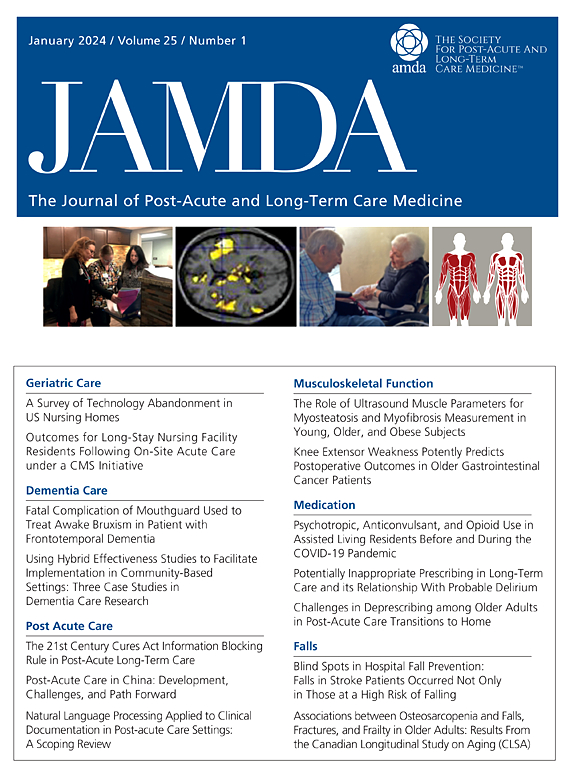园艺疗法对无痴呆症老年人的疗效:系统回顾与元分析》。
IF 4.2
2区 医学
Q2 GERIATRICS & GERONTOLOGY
Journal of the American Medical Directors Association
Pub Date : 2024-10-09
DOI:10.1016/j.jamda.2024.105296
引用次数: 0
摘要
目的:园艺疗法(Horticultural therapy,HT)因其对心理和身体的益处而日益受到关注。以往的研究表明,园艺疗法对患有认知障碍或精神疾病的老年人有治疗作用。然而,其对未患痴呆症的老年人的影响尚未得到综合研究。本系统性综述研究了高温热疗对无痴呆症的老年人的身体和社会心理功能的影响:设计:系统综述和荟萃分析:方法:随机对照试验和准对照试验:在 7 个数据库中系统检索了随机对照试验和准实验研究。采用 Cochrane 第 2 版偏倚风险工具和非随机干预研究偏倚风险工具评估研究质量。使用 Hedges'g 进行随机效应荟萃分析以估计效应大小,并使用 Cochran's Q 检验和 I2 评估异质性。采用建议分级评估、发展和评价方法确定证据的总体质量:共纳入 27 项研究,包括 11 项随机对照试验和 16 项准实验研究,涉及 11 个国家的 1629 名老年人。高温热疗倾向于改善老年人的社会心理结果,尤其是自我效能(g = 0.52;95% CI,0.26-0.79)和自尊(g = 0.52;95% CI,0.26-0.79)。就对身体的益处而言,有氧运动似乎对有氧耐力的影响更大,其效应大小较大(g = 0.84;95% CI,0.54-1.15),相比之下,敏捷性的效应大小较小(g = 0.45;95% CI,-0.90 至-0.01):本综述表明,高温热疗可为没有痴呆症的老年人带来心理和身体上的益处。这些益处包括自我效能感、自尊、有氧耐力和灵活性的轻微改善。然而,由于采用的是准实验设计,结果测量可能存在偏差,因此证据的确定性很低。有必要通过设计良好的临床试验进行进一步研究,以确认其有效性。本文章由计算机程序翻译,如有差异,请以英文原文为准。
Effectiveness of Horticultural Therapy in Older Adults without Dementia: A Systematic Review and Meta-Analysis
Objectives
Horticultural therapy (HT) has garnered growing interest because of its psychological and physical benefits. Previous reviews have demonstrated its therapeutic effects in older adults with cognitive impairment or mental illnesses. However, its impact on older adults without dementia has not been synthesized. This systematic review studied the effects of HT on the physical and psychosocial functions of older adults without dementia.
Design
Systematic review and meta-analysis.
Settings and Participants
Older adults without dementia ≥60 years of age.
Methods
Randomized controlled trials and quasi-experimental studies were systematically searched in 7 databases. The Cochrane Risk of Bias Tool version 2 and the Risk of Bias in Non-randomized Studies of Interventions tool were used to assess study quality. A random-effects meta-analysis with Hedges' g was conducted to estimate the effect size, and Cochran's Q test and I2 were used to evaluate heterogeneity. The Grading of Recommendations Assessment, Development, and Evaluation approach was applied to determine the overall quality of evidence.
Results
Twenty-seven studies, including 11 randomized controlled trials and 16 quasi-experimental studies comprising 1629 older adults from 11 countries, were included. HT tended to improve psychosocial outcomes in older adults, particularly in terms of self-efficacy (g = 0.52; 95% CI, 0.26-0.79) and self-esteem (g = 0.52; 95% CI, 0.26-0.79). In terms of physical benefits, HT appeared to have a greater impact on aerobic endurance, with a large effect size (g = 0.84; 95% CI, 0.54-1.15), compared to agility, which showed a smaller effect size (g = 0.45; 95% CI, −0.90 to −0.01).
Conclusions and Implications
This review demonstrated that HT could provide psychosocial and physical benefits to older adults without dementia. These benefits include slight improvements in self-efficacy, self-esteem, aerobic endurance, and agility. However, the certainty of this evidence is very low due to the quasi-experimental design and potential bias in outcome measurements. Further research with well-designed clinical trials is necessary to confirm its effectiveness.
求助全文
通过发布文献求助,成功后即可免费获取论文全文。
去求助
来源期刊
CiteScore
11.10
自引率
6.60%
发文量
472
审稿时长
44 days
期刊介绍:
JAMDA, the official journal of AMDA - The Society for Post-Acute and Long-Term Care Medicine, is a leading peer-reviewed publication that offers practical information and research geared towards healthcare professionals in the post-acute and long-term care fields. It is also a valuable resource for policy-makers, organizational leaders, educators, and advocates.
The journal provides essential information for various healthcare professionals such as medical directors, attending physicians, nurses, consultant pharmacists, geriatric psychiatrists, nurse practitioners, physician assistants, physical and occupational therapists, social workers, and others involved in providing, overseeing, and promoting quality

 求助内容:
求助内容: 应助结果提醒方式:
应助结果提醒方式:


